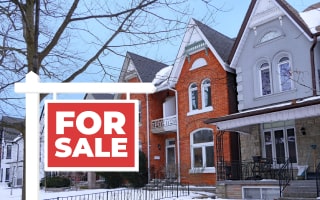Home Buying in Pennsylvania

From vibrant cities like Philadelphia and Pittsburgh and the historic charm of towns like Gettysburg, to the serenity of the Poconos, Pennsylvania, also known as the Keystone State, offers a diverse landscape that caters to a variety of lifestyles.
The state's economy is robust, driven by manufacturing, healthcare, education, and finance. Pennsylvania boasts a strong job market, a relatively low cost of living compared to many coastal states, and a high quality of life. With its excellent schools, world-class universities, and abundant recreational opportunities, Pennsylvania is an attractive destination for families and individuals. Despite its popularity, the state has experienced an overall decline in population recently.
The Pennsylvania housing market is dynamic, with many urban, suburban, and rural properties available. While prices can vary significantly depending on the location and amenities, the state generally offers affordable housing options compared to other parts of the country. The median home price in Pennsylvania is $250,000, which is lower than the national average and lower than in neighboring states like New Jersey, New York, Delaware, Maryland, and Virginia. This makes it a desirable choice for homebuyers on a budget.
Homes in Pennsylvania usually sell within a month of being listed, reflecting the state's buyer's market, which is quite competitive, particularly in popular areas like Philadelphia and Pittsburgh. In these more popular areas, homes sell even more quickly, often above the asking price.
Before entering the Pennsylvania housing market, homebuyers must be prepared to research local trends, understand regional differences, and consider factors such as school districts, commute times, and property taxes. Working with a knowledgeable local real estate agent can be invaluable in navigating the market and finding the perfect Pennsylvania home.
Pennsylvania Housing Trends
Housing trends in Pennsylvania can greatly influence home-buying decisions. While some urban areas like Philadelphia and Pittsburgh have faster-paced markets, other regions of the state experience more moderate activity. Pennsylvania has its own unique dynamics that may impact your purchase.
Here are some important facts and figures to consider:
-
Median Home Price
The median home price in Pennsylvania is around $250,000, which is below the national average and offers many homebuyers, especially first-time buyers, more opportunities to enter the market. However, home prices in Pennsylvania vary significantly depending on the region. In cities like Philadelphia and Pittsburgh, median home prices can rise to around $275,000 or higher, while smaller towns and rural areas may have more affordable options, sometimes dropping to below $200,000.
-
Number of Houses Sold in Pennsylvania
Home sales in Pennsylvania have remained relatively stable, with occasional fluctuations driven by economic factors, population shifts, and the impact of the pandemic. Roughly 110,000 homes are sold annually statewide, with a significant portion of those transactions occurring in the Philadelphia and Pittsburgh metropolitan areas. Pennsylvania's housing market has seen an increased demand for single-family homes, especially in suburban areas, as many buyers seek more space and affordability than urban living.
-
Median Days on Market
Pennsylvania's median Days on Market (DOM) figure consistently hovers around 25 days, though this figure can vary greatly depending on location. In popular urban areas like Philadelphia and Pittsburgh, homes sell faster, often staying on the market for less than 20 days. In contrast, properties in more rural or less competitive regions of Pennsylvania may remain on the market for significantly longer, sometimes more than 40 days.
-
Housing Supply
Although the number of listings continues to tick up, Pennsylvania's overall inventory has not been enough to meet the demand. This is especially true in and around metro Philadelphia and Pittsburgh. This imbalance has increased prices as buyers compete for the limited properties. The housing supply is more stable in rural parts of Pennsylvania, such as the northern and central regions of the state. However, it can still be impacted by local economic factors.
How to Find the Right Home to Buy in Pennsylvania

When it comes to home buying in Pennsylvania, partnering with a local realtor is an essential step. Navigating Pennsylvania's diverse housing market, from urban centers like Philadelphia to rural areas in the Pocono Mountains, requires expert guidance. A local real estate agent will help you understand the complexities of the market and how they affect your needs and goals to match you with the right home. If you are looking for a reputable agent, referrals from family members and friends or online reviews can go a long way in helping you make your choice.
Finding the Right Home
Finding the right home in Pennsylvania involves considering several key factors, such as location, the type of home you want to live in, and any costs associated with owning a home, such as property taxes.
Location
Pennsylvania offers a wide range of living environments, each with its own distinct advantages. Whether you're drawn to its bustling cities or more peaceful areas of the state, like Lancaster County or the Lehigh Valley, location should play a pivotal role in your decision.
-
Urban vs. suburban vs. rural: Philadelphia offers a vibrant urban experience with cultural amenities, job opportunities, and easy access to public transportation. Suburban areas around cities like Pittsburgh and Harrisburg provide more space, family-friendly neighborhoods, and proximity to top schools. In rural Pennsylvania, areas such as the Poconos and central Pennsylvania offer tranquility, affordability, and access to nature, ideal for buyers looking to escape the hustle and bustle of city life.
-
Proximity to Work: Pennsylvania's major employment centers are in and around Philadelphia, Pittsburgh, and Harrisburg, and living in these cities typically means shorter commutes for professionals. If commuting isn't a concern, homebuyers may want to explore homes in rural areas, where properties are often more affordable.
-
Public Transportation: Pennsylvania has an extensive public transportation network, particularly in larger cities. The Southeastern Pennsylvania Transportation Authority (SEPTA) operates bus, rapid transit, commuter rail, light rail, and electric trolleybus services for nearly four million people throughout Bucks, Chester, Delaware, Montgomery, and Philadelphia counties. The Pittsburgh Regional Transit system offers bus and light rail services around Pittsburgh. Public transit is limited in rural areas, so access to major highways and roads is an important consideration for homebuyers relying on personal vehicles to commute.
-
Property Taxes: Pennsylvania's statewide average property tax rate is around 1.36%, higher than the national average. However, that number varies by county, with some areas having property tax rates as high as 2.45%. In other parts of the state, particularly in more rural areas, homeowners may see a tax rate more in line with the national average. That's why homebuyers must consider these taxes when budgeting for their home.
Types of Homes in Pennsylvania
Pennsylvania offers a variety of home types, each catering to different homebuyer needs and preferences.
-
Single-Family Homes: Single-family dwellings make up most homes for sale in Pennsylvania, especially in the Philadelphia, Pittsburgh, and Harrisburg suburbs. These homes typically offer ample yard space and privacy, making them a popular choice among homebuyers with families or looking to settle down.
-
Condominiums and Townhomes: Condos and townhomes are common in Pennsylvania's urban areas. They provide a low-maintenance lifestyle with shared amenities such as fitness centers and pools. Townhomes offer a balance between single-family homes and condos, providing more space but with fewer maintenance responsibilities.
-
Historic Homes: Pennsylvania, with its rich history, has many historic properties, especially in and around Philadelphia and Lancaster. These homes offer unique charm but may come with additional maintenance requirements or restrictions related to historic preservation laws.
-
Manufactured and Modular Homes: Manufactured and modular homes are popular in rural areas. They are affordable and offer many of the same benefits and features as more traditional single-family homes.
-
Luxury Homes: In Pennsylvania, many high-end properties are available in areas like the Main Line outside Philadelphia and the state's many affluent suburban neighborhoods. These homes often feature modern amenities and are in prime, sought-after locations.
The Home Buying Process in Pennsylvania
When home buying in Pennsylvania, there are several steps buyers will have to take, including:
- Obtaining a prequalification letter.
- Working with a local real estate agent.
- Making an offer on a home.
- Scheduling a home inspection.
- Closing on the home.
Financing Your Pennsylvania Home Purchase

Pennsylvania offers a variety of financing options for homebuyers, ranging from traditional mortgages to government-backed loans. Understanding the available options will help you find the best fit for your financial situation.
![]() Traditional Mortgages
Traditional Mortgages
Pennsylvania homebuyers can choose between fixed-rate and adjustable-rate mortgages (ARMs), each offering different advantages based on your needs and long-term plans.
- Fixed-Rate Mortgages: A popular choice for Pennsylvania homebuyers who plan to stay in their home long-term, fixed-rate mortgages provide stability with consistent monthly payments and an interest rate that remains the same over the life of the loan. This option is ideal for buyers who prefer predictability and want to avoid market fluctuations.
- Adjustable-Rate Mortgages (ARMs): ARMs typically offer lower initial rates, making them attractive to buyers looking for short-term savings. However, the interest rate adjusts periodically based on market conditions, which makes it incredibly risky, especially for homeowners on a fixed budget. An ARM is a good option for homebuyers who plan to sell or refinance before the rates change or when interest rates are expected to decline.
In Pennsylvania, major national banks like PNC Bank and Citizens Bank and local lenders like Pennsylvania State Employees Credit Union (PSECU) provide a wide range of mortgage options, often tailored to first-time homebuyers and those looking for flexible loan programs.
![]() Government-Backed Loans
Government-Backed Loans
Pennsylvania offers a range of government-backed home loans for those who qualify, which can provide added support for buyers with limited down payments or lower credit scores.
- FHA (Federal Housing Administration) Loans: FHA loans help low-to-moderate-income homebuyers by offering lower down payment requirements and more lenient credit score criteria than traditional home loans.
- VA (Veterans Affairs) Loans: Available to veterans, active-duty military members, and their families, VA loans offer competitive interest rates and zero down payment options, making homeownership more accessible.
- USDA (United States Department of Agriculture) Loans: USDA loans are designed to assist homebuyers in rural and suburban areas with no down payment and low-interest financing. Many homes in rural parts of Pennsylvania, such as in the Poconos region or central Pennsylvania, qualify for these loans.
![]() Down Payment Assistance Programs in Pennsylvania
Down Payment Assistance Programs in Pennsylvania
Pennsylvania offers various down payment assistance programs for homebuyers, particularly first-time buyers:
- Pennsylvania Housing Finance Agency (PHFA) Assistance: The PHFA provides down payment and closing cost assistance programs to qualified buyers through the Keystone Advantage Assistance Loan Program and the HOMEstead program. These options help buyers with upfront costs, making homeownership more attainable.
- County and Local Assistance: In addition to state programs, many Pennsylvania counties and cities offer down payment assistance initiatives. Buyers should check with local housing authorities for more specific options based on location.
Home Insurance in Pennsylvania

The average annual cost of home insurance in Pennsylvania is $1,900, which is lower than the national average. However, premiums vary based on location. For example, Lancaster, Harrisburg, and York have the lowest rates, while Philadelphia, Chester, and Altoona have some of the highest. Similarly, newer homes and homes away from the coastline boast lower rates. Even though Pennsylvania doesn't face the same extreme weather events as some other states, certain regions may still experience risks from flooding, heavy snowfall, and occasional windstorms, particularly in areas near rivers or along the eastern mountain ranges. This could drive up insurance premiums in those areas.
Homebuyers should always factor in the cost of homeowners insurance when determining their overall budget for purchasing a home. It's also wise to explore discounts, such as bundling home and auto insurance, to lower premiums and ensure adequate coverage.
Home Buying Challenges in Pennsylvania
While Pennsylvania's housing market offers a range of opportunities for buyers, it also presents several challenges:
-
Rising home prices: In cities like Philadelphia and Pittsburgh, rising demand has increased home prices, making it harder for some buyers to find affordable options. This is especially true in desirable neighborhoods and growing suburban markets.
-
Limited inventory: The housing inventory in Pennsylvania has been tight in recent years, particularly in suburban areas surrounding major cities. Buyers may face increased competition, leading to bidding wars and higher prices.
-
Property Taxes: Pennsylvania has relatively high property tax rates, which can be a significant factor when budgeting for homeownership. Buyers need to be aware of the variations in tax rates between counties and municipalities, as this can impact their long-term affordability.
-
Flood risk: While Pennsylvania is not prone to hurricanes or tornadoes, certain areas, especially those near rivers or low-lying regions, face the risk of flooding. This can lead to higher insurance premiums and may require flood insurance, adding to the cost of homeownership.
Pennsylvania Home Inspections
A Pennsylvania home inspection can prevent costly repairs after buying a home. It can also ensure the house is safe and priced appropriately according to its value. A home inspection is part of the due diligence process when buying property. It is designed to protect the buyer and help them make an informed decision. It also provides the potential for renegotiation of the price or other options.
A Pennsylvania home inspection includes a physical examination of many aspects of the home, such as:
-
Structural Components: Foundation, walls, ceilings, floors, and roof.
-
Exterior: Siding, trim, porches, decks, balconies, walkways, and driveways.
-
Roofing: Shingles, flashing, chimneys, and gutters.
-
Plumbing: Pipes, water heaters, sinks, tubs, toilets, faucets, showers, drains, etc.
-
Electrical: Wiring, panels, outlets, and light fixtures.
-
Heating and Cooling: HVAC units, furnaces, boilers, and ductwork.
-
Interior: Walls, ceilings, floors, windows, staircases, and doors.
-
Insulation and Ventilation: Attics, crawlspaces, basements, and insulation.
-
Fireplaces: Chimneys, flues, and vents.
-
Termites: Pest infestations.
-
Radon: Air/water.
A Pennsylvania home inspection costs between $300 and $500 based on the size, age, location of the property, and scope of the inspection. Prices vary by city. For example, a Philadelphia home inspection costs $300-$500.
The Process
Typically, the buyer pays for the home inspection in Pennsylvania. However, it is not unusual for a buyer to negotiate it in the contract so that the seller pays. The process is as follows:
- Find a good-quality inspection company.
- Schedule the inspection.
- Be there for the inspection and ask questions. Depending on the complexity, it usually takes between 2 and 4 hours.
- Review the completed inspection report and decide what to do next.
The Top Five Home Inspection Companies in Pennsylvania
- Liberty Inspection Group - Media, PA
- Eagle Inspections - Philadelphia, PA
- Hill Property Inspections LLC - Johnstown, PA
- Foundations Property Inspections - Jefferson Hills, PA
- Alpha Home Inspections LLC - Duncannon, PA
After the Inspection
After the inspection, the buyer has some options. If the report reveals any serious concerns, the buyer can back out of the deal, ask the seller to make the repairs at their expense, or request a home warranty. They could also negotiate a lower price or ask to put down a lower down payment. Either way, it works out for the buyer and gives them some negotiating power.
Inspection Top Cities
| City | Inspection Cost | Local Issues | Local Rules | Local Home Types |
|---|---|---|---|---|
| Home Inspection in Philadelphia | $336-$410 based on the size and condition of the home. | Plumbing, roof, HVAC, foundations, and outdated wiring. | Inspectors need to be licensed by the Department of Licenses and Inspections (L&I). | Row houses, brownstones, trinities, Georgian townhouses, urban mansions, modern high-rise condos. |
| Home Inspection in Pittsburgh | $400-$600 based on the size and type of the home. | Roof, foundation, doors, plumbing, and improper drainage. | According to industry standards, no city rules. | Condos, duplexes, farms, foreclosure homes, ranches, bungalows, craftsman, traditional, and contemporary. |
| Home Inspection in Allentown | $300-$500 based on the size, age, and inspection services. | Roof, plumbing issues, electrical hazards, water damage, and HVAC. | None specified. | Historic rowhouses, Victorian, Craftsman style homes, modern single-family, and twin-family homes. |
| Home Inspection in Erie | $300-$500 based on the home's size, age, and the scope of the inspection. | Roof, foundation, plumbing, electrical systems, and HVAC. | Governed by the Home Inspection Professional License Law. | Single-family homes, condos, townhouses, and multi-family dwellings. |
| Home Inspection in Scranton | $300-$500 based on the home's size, age, and the scope of the inspection. | Plumbing issues, roof problems, poor drainage, mold, and faulty wires. | No specific rules for home inspections. | Victorian, ranch-style homes, apartment buildings, four-over-four houses. |
Navigating the Pennsylvania Housing Market
Buying a home in Pennsylvania offers various options, from urban living in cities like Philadelphia and Pittsburgh to more rural and serene settings in the Poconos or central Pennsylvania. The state's affordable median home prices, strong job market, and high quality of life make it an attractive choice for homebuyers of all types. However, navigating the market comes with unique challenges, such as rising home prices in competitive areas, limited inventory, high property taxes, and high insurance costs, especially in flood-prone regions.
Preparation is key for prospective homebuyers. Understanding local housing trends, financing options, and regional challenges will help buyers make informed decisions. Partnering with a knowledgeable local real estate agent can be invaluable in this process, ensuring you find the right home in the right location that meets your needs and budget.
Ultimately, finding your dream home in The Keystone State is achievable with the right guidance, due diligence, and a strategic approach.
Home Buying Guide
Instant Access to Pennsylvania Property Records
- Owner(s)
- Deed Records
- Loans & Liens
- Values
- Taxes
- Building Permits
- Purchase History
- Property Details
- And More!